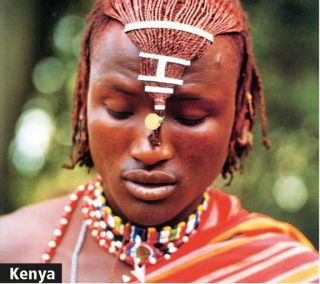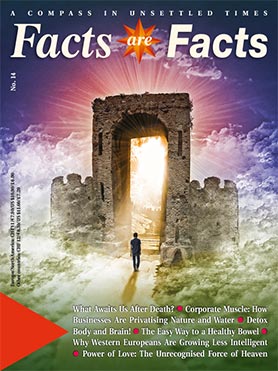A Question of Consciousness
Our world offers many classrooms for souls in different states of development. It is therefore no coincidence where someone is born. Only by understanding reincarnation can we get a grip on the migration problem in the long-term.
 As the old saying goes, ‘Every man is the architect of his own fortune’. For most people that’s kind of acceptable, as long as you’re only thinking about one earthly lifetime. What if this epigram were to be valid for more than that, though? We Westerners have forgotten the factuality of reincarnation. There are more than a billion people in the world who have got one over on us in this respect.
As the old saying goes, ‘Every man is the architect of his own fortune’. For most people that’s kind of acceptable, as long as you’re only thinking about one earthly lifetime. What if this epigram were to be valid for more than that, though? We Westerners have forgotten the factuality of reincarnation. There are more than a billion people in the world who have got one over on us in this respect.
Based on this ignorance, many people believe that everybody ought to have the same chances in life—and confuse this ideal with justice. For although the life and dignity of every single human being ought to be sacrosanct, one thing’s for sure: we all reap what we sow, even when that seed was sowed in an earlier lifetime.
There are around seven billion different living circumstances on this planet, because that’s how many individual human beings there are. We all created the conditions of our lives ourselves, even if many people are not aware of it. The Eastern tradition calls this karma. Westerners, being rationally, scientifically educated, like to talk about genes. Yet looked at in a different way, these ‘genes’ become nothing more than a three-dimensional expression of our—karma.
What Are Genes Anyway?
 Used to analysing and dissecting, our Western science claims that every species, and even each individual, has its own specific genetic code. The genetic fingerprint of an earthworm is completely different to that of a human being, that’s fair to say. But is it true that living creatures all possess a totally different genetic code—or is it actually the case, that they all carry the same universal genetic code, and are thus connected with the source of all life, ‘God’? Could these different manifestations of the universal code simply reflect differing levels of development—like a tree could put forth innumerable buds, which are all potentially present within the tree? The latest findings in noetics1 and other branches of research into consciousness indicate that this is exactly the case—something that has long been known in the occult tradition.
Used to analysing and dissecting, our Western science claims that every species, and even each individual, has its own specific genetic code. The genetic fingerprint of an earthworm is completely different to that of a human being, that’s fair to say. But is it true that living creatures all possess a totally different genetic code—or is it actually the case, that they all carry the same universal genetic code, and are thus connected with the source of all life, ‘God’? Could these different manifestations of the universal code simply reflect differing levels of development—like a tree could put forth innumerable buds, which are all potentially present within the tree? The latest findings in noetics1 and other branches of research into consciousness indicate that this is exactly the case—something that has long been known in the occult tradition.
The higher the vibration of the consciousness of a living being, the more complex the manifestation of its genetic information will be. That’s why the simple genetic structure of the earthworm could be decoded so much more quickly than the human one. Although ‘decode’ is perhaps not quite the right word. According to geneticists, 90% of the human genome could be quite happily chucked away (i.e. ‘junk DNA’), because it serves no useful function. Supposedly. In reality, these ‘sleeping’ DNA sequences remain unused quite simply because man hasn’t reached the level of consciousness necessary to activate them. In other words: right now, science knows very little about the universal gene code of all life.
 That’s why scientists claim that a person’s genetic code is something unchangeable, written in stone. Anyone who has a particular genetic predisposition is powerless to change their future, bring it good or ill. Yet this claim has long been disproven. People who suffer from Down’s Syndrome, for example, have been able to overcome this mental disability, even if the genetic deformation still remained in their genes. How can that be possible, if consciousness isn’t more powerful than genes? Could it not even be said that our genes express our consciousness—ergo, they can be influenced by it?
That’s why scientists claim that a person’s genetic code is something unchangeable, written in stone. Anyone who has a particular genetic predisposition is powerless to change their future, bring it good or ill. Yet this claim has long been disproven. People who suffer from Down’s Syndrome, for example, have been able to overcome this mental disability, even if the genetic deformation still remained in their genes. How can that be possible, if consciousness isn’t more powerful than genes? Could it not even be said that our genes express our consciousness—ergo, they can be influenced by it?
…And What’s Karma?
According to occult teachings, genes determine not only the physical structure of an organism, but also have another, more spiritual role. That role is to contain our karma, almost like a seedpod. When the time is ripe, these ‘karma capsules’ burst open (metaphorically speaking) and we find ourselves having to face certain situations in our lives, the conditions of which we have brought upon ourselves by our actions, unredeemed and unbalanced, and omissions, in a past life. Nevertheless, karma is not punishment! Karma is actually an opportunity to learn. Being confronted with the consequences of past mistakes, we get the chance to do it right this time. Our consciousness can grow and develop, and so can our soul. Karma helps us to learn the law of cause and effect in the simplest and most efficient way for each individual. Hence, karma is grace made manifest, which, however, doesn’t preclude suffering. As we all know, pain is sometimes the best teacher of all—particularly when we haven’t reacted to previous, gentle hints.
As every soul looks back on an individual life-journey, full of decisions it made itself, it’s only logical that every individual human being also possesses an individual genetic code.
Science claims that parents pass on the majority of their genetic code to their children—so the children often demonstrate similar susceptibility to illness and similar intelligence as their parents (intelligence has been shown to be up to 50% genetic). Yet claiming that we are thus ‘victims of our genes’ is putting the cart before the horse. We choose these people as our parents precisely because we have a similar consciousness as them, because our karma requires living conditions similar to theirs. They are the springboard that lets us start the new life on earth corresponding best to our karma.
What goes for families, goes for nations too. Our karma—which is also the expression of our level of consciousness—determines where we are born. This natural spread of development of human consciousness is therefore the real reason why different nations have such different ‘national IQs’, as we saw in the previous article.
 It’s no coincidence if you are born in Germany, or in Ethiopia. Each land is a classroom for particular souls, where they can learn certain things particularly well. But we can only understand this fact of life when we accept reincarnation as the fact it is. When science emphasises the decisive influence of the genes, it is unknowingly emphasising the relationship between consciousness and karma. Yet while science degrades us to helpless victims of circumstance, spiritual knowledge makes us masters of our own fortune.
It’s no coincidence if you are born in Germany, or in Ethiopia. Each land is a classroom for particular souls, where they can learn certain things particularly well. But we can only understand this fact of life when we accept reincarnation as the fact it is. When science emphasises the decisive influence of the genes, it is unknowingly emphasising the relationship between consciousness and karma. Yet while science degrades us to helpless victims of circumstance, spiritual knowledge makes us masters of our own fortune.
The thin layer of humus which allows a plant to grow between two boulders is, in a figurative sense, gratitude. That is the foundation upon which we can gradually improve the circumstances of our life.
Gratitude Moves Us Forward
When we start to value life—to be thankful for what life offers us—we start to give life something back. And what we give determines what we receive. There is hardly a more important realisation than this: we choose our next life by what we do in this one. If we do nothing, our next life will be just the same. We will find ourselves in the same situation, the same circumstances, surrounded by the same people—and we won’t like the situation nor the people. But when we start to give something back to life, and be grateful for what we have already received, then the chances are that in our next incarnation we will find ourselves in a better position.
This applies to a Swiss just as much as to an Indian Pariah. We all have good reason to be grateful—even if some may have fewer reasons than others. That’s why it’s not a good thing when too many people from quite different, poorer parts of the world emigrate to the West. It’s not just different cultures that collide, but also completely different levels of consciousness. The mixture of completely different ways of life weakens the national spirit of natives and foreigners alike, as it makes it more difficult for both groups to live in surroundings which correspond to their spiritual development. In other words: these uprooted people find it exceedingly difficult to achieve their divine plan for this incarnation and to learn what they need to learn. That is the real, spiritual reason why they become unhappy.
Viewing this problem at the level of consciousness, it soon becomes clear why real integration only takes place to a very limited extent. More often than not, gaps appear and parallel societies develop, as has happened more and more frequently in European countries. African author Nambo Banao, resident in Switzerland, warned his compatriots emphatically “Europe is a trap. Better stay at home”.
The Freedom To Be Egotistical
According to the American constitution, everyone has the right to the ‘pursuit of happiness’. Yet what is happiness? What is the meaning of life? Where did we come from? Where are we going? These most simple and basic of all questions cannot be answered by most people nowadays. That is tragic. Our society has lost its inner compass, its focus on the actual spiritual target: the development of our consciousness.
Instead of that, according to Banao, many Africans want to come to Europe so that they can finally be as well-dressed as the people they admire on satellite TV. What they actually experience is more like what happened to the Algerian Abdel Sellou, who we will learn more about later. He talks about his childhood in the godforsaken suburbs of Paris. “Where I grew up, you have no role models—at best, the older guys who show off how cool they are. You experience nothing beautiful, you see nothing beautiful—the only thing that catches your attention is advertising. That makes you want all the designer labels, the cool cars, but it’s all out of your reach. Unless you simply take what you want”.
 Does everyone have the right to steal? Should that be part of our bourgeois freedoms? “Of course not!” we’d all object. And what about the right to egotism? Many politicians and captains of industry consider this to be the engine of capitalism. Yet where is the moral difference between an immigrant stealing a car, and a businessman deserting a foundering bank with a million dollar payoff?
Does everyone have the right to steal? Should that be part of our bourgeois freedoms? “Of course not!” we’d all object. And what about the right to egotism? Many politicians and captains of industry consider this to be the engine of capitalism. Yet where is the moral difference between an immigrant stealing a car, and a businessman deserting a foundering bank with a million dollar payoff?
We studiously ignore the fact that there are two sides to every coin. That means that we can’t have freedom without responsibility. Being responsible means taking the wellbeing of others into consideration and acting in accordance with that. And this characteristic is most definitely a question of consciousness! Many immigrants from backward regions of the world want to share in the freedoms we enjoy in rich industrialised nations, but they often lack the developed consciousness that would enable them to shoulder the responsibility for the common well-being that goes with it. That’s the reason why most of them were born in underdeveloped countries in the first place. (Naturally there are exceptions: every country has highly developed people who have the courage and determination to fight for better living conditions and the rights of their fellow citizens!)
Egotism will destroy a country and its people; altruism will uplift it. Greece is not the only country currently learning this lesson. The Greeks—placed firmly at the bottom of the EU ranking thanks to both their national IQ and their catastrophic economic problems—have destroyed their own state not least thanks to pure egotism. Foreign correspondent Werner van Gent has lived for some years in Athens, and recently explained on Swiss radio that the background to the severe economic crisis is that special interests have always been in control of the Greek political system. Everyone looked only to their own advantage, from the politicians right at the top down to the trades unions.
We can still hope that the Greeks will discover the power of working together toward a common goal, after they have vented their shock and frustration. The ‘rubble women’ of post-war Germany serve as an inspiration to us all in these difficult times. They grafted to achieve a clear goal. What goal have we set for our own lives?
Losing Sight Of The Target
The following lines of the Chinese philosopher Confucius (551 to 479 BC) have been brought down to us:
He who knows the aim, can decide
He who decides, finds peace
He who finds peace, is safe
He who is safe, can consider
He who considers, can improve!
Whoever mulls over these simple words will recognise the wisdom they contain. Everything starts with aiming at the right target.
We live in extremely stressful and restless times. The watchword is availability at all times. Smartphones and tablets make it possible, Apple be praised! Facebook and Twitter make sure that we never feel lonely. Intoxicated by the alleged freedom that these mobile communication toys seem to offer us, we don’t even have time to notice how we are rushing headlong to our own demise like a hamster in its wheel. We keep ourselves busy to distract ourselves from the emptiness we feel inside, and prefer the noise of technology to the harmony of stillness. Better always online, rather than going offline now and then—even if it means we burn out.
We are no longer at peace with ourselves. We don’t feel secure in life—we feel like we have to constantly fight for survival, never knowing when we are going to lose our job, when our girlfriend is going to leave us, or if we might get cancer. We are the slaves of a system that seems to wrest all power of decision in our life from our hands. Everyday problems have grown from ripples that touch the edge of the conscious mind, to a storm tide that threatens to sweep us away. We no longer have time to stop for a moment and think—like a shark, we have to keep swimming, or drown.
Quite obviously, our 24/7 world pays little heed to the wisdom of the Chinese sage. From Confucius’ point-of-view, this is why we struggle so much to better ourselves: to let the buds of our consciousness blossom, like any flower does.
According to Confucius, the cause of this creeping spiritual sickness is a lack of true goals. Today’s ambitions are power, riches, success, celebrity, and (artificially improved) beauty. In contrast to betterment of the soul, all these are transitory.
 We’ve taken our eye off the real spiritual aim, because our society has been directed toward maximum economic efficiency, driving out all spirituality. For this reason, most of our best minds find themselves in terrible spiritual shape. They may be great intellectuals, smart as a whip, producing astonishing technological masterpieces, yet the ennoblement of society is out of their reach. No one works for a higher purpose.
We’ve taken our eye off the real spiritual aim, because our society has been directed toward maximum economic efficiency, driving out all spirituality. For this reason, most of our best minds find themselves in terrible spiritual shape. They may be great intellectuals, smart as a whip, producing astonishing technological masterpieces, yet the ennoblement of society is out of their reach. No one works for a higher purpose.
The late American actor Patrick Swayze once said that, “If you don’t fix your aim at the stars, you won’t even get on the church tower”. Who is up with the stars though? Not today’s starlets, that’s for sure. In Shakespeare’s tragedy ‘Henry VIII’, Cardinal Wolsey exhorts Thomas Cromwell to “Be just, and fear not; Let all the ends thou aim’st at be thy country’s; Thy God’s, and truth’s”.2
True aims serve the common good; they are moral and bound to truth. Why? Because they are ‘God’s aims’, who is ‘up with the stars’ according to many religions. Our greatest aspiration should be to match the divine—Confucius was convinced of that too. With this attitude, all other priorities fall into their rightful place.
Unfortunately, people have forgotten what God really is. During the time when the Indian subcontinent was still part of the British Empire, an English gentleman is said to have asked a guru exactly how many gods there were in the Hindu religion. The sage is said to have replied “So many gods as there are people”. Since the population of India at that time was about 300 million, the idea that Hinduism venerates this number of divine beings has persisted ever since.
This myth, which is still widely believed today, is nonsense of course. Even the Hindus, used to a multiplicity of divinities, would lose track of so many gods! The Indian guru meant something quite different. What he wanted to demonstrate to the Englishman was the divinity within the heart of every human being. The externalised Western consciousness can only imagine the one God, ‘somewhere up there’, rather than being able to look within. Yet each individual is a cell within the body of God.
All Men Are Equal
Liberté, Egalité, Fraternité: much has been written about this noble slogan of the not quite so noble French Revolution, yet there is hardly a concept that is more misunderstood than ‘equality’.
Are we really all equal? Yes, that is essentially true. Even for our bodies. Everyone’s blood is red—whatever colour our skin might be. Or, as Shylock the Jew put it so forcefully in his famous soliloquy, “If you prick us, do we not bleed? If you tickle us, do we not laugh? If you poison us, do we not die?”3
Although actually, only our bodies die. We are all spiritual beings, born into eternity. We have chosen this planet as our classroom in order to become, over the course of many lives on earth, as perfect as ‘our Father in Heaven’. We are star dust, destined to be shining suns one day; unborn ‘gods’ and ‘goddesses’ (still in the semi-conscious state of an embryo), but still divine beings all the same. It’s no coincidence that the Bible describes mankind as the ‘crown of creation’. And mankind will receive its true inheritance on earth when it is not just born of water (physical birth), but of the fire of the spirit too (cf. John 3:5-7). This spiritual rebirth is the true Second Coming of the Son of Man, which so many Christians are waiting for. It has nothing at all to do with the supposed physical return of Jesus, but rather with the spiritual awakening of the Christ consciousness within us4 —while we remain in the same physical form on earth. The Christ within is the true common denominator which links all humans.

 Mankind will then finally be in a position to create the ‘paradise’ on earth we all dream of, and to improve all life to that end. There have always been people who have done this, and today too there are many who have been ‘reborn’. Yet the great masses continue to ‘sleep’.
Mankind will then finally be in a position to create the ‘paradise’ on earth we all dream of, and to improve all life to that end. There have always been people who have done this, and today too there are many who have been ‘reborn’. Yet the great masses continue to ‘sleep’.
Thanks to his inherent divinity, man has the potential to create his or her own personal ‘heaven’ or ‘hell’—corresponding to his/her thoughts, feelings, and actions. Even if they live in totally different worlds, there is not the slightest difference between the potential of the divine spark in the heart of the Utoya mass murderer Anders Behring Breivik, and that of a Mahatma Gandhi. Seen this way, all men are equal; and their lives should be sacrosanctly holy. Hence Jesus taught us to “Love your fellow man as you love yourself”. Contempt and even racism have no place here. Especially if you know the facts about reincarnation. We have all already lived in many different cultures and races.
Now, nobody would think of claiming that the ‘Monster from Norway’ possessed the same consciousness as the liberator of India, who abhorred any kind of violence. Just as parents have more rights (and responsibilities) than children, it’s natural that people with a higher level of consciousness are born into conditions with more privileges and at the same time greater responsibilities. That doesn’t mean that they are worth any more than those fellow creatures who are one or two rungs below them on the endless ladder of spiritual attainment—in the same way that we don’t think any less of a child for still having a childish consciousness.
Advocates of political correctness should bear this in mind when they demand the same circumstances for all people, regardless of their background. These ‘birth privileges’ are dependent on the consciousness of the person concerned, and shouldn’t be confused with the basic and inviolable human rights that every human being is entitled to!
Sources
- 1 Cf. FaF No. 8, page 53: Noetics: Space Travel Through the Inner Universe
- 2 Henry VIII, Act 3, Scene 2
- 3 From Shakespeare's 'The Merchant of Venice'.
- 4 You can find out more about reincarnation (physical), rebirth (spiritual), and the Second Coming in FaF from page 38: Reincarnation Is Not Being Born Again!






